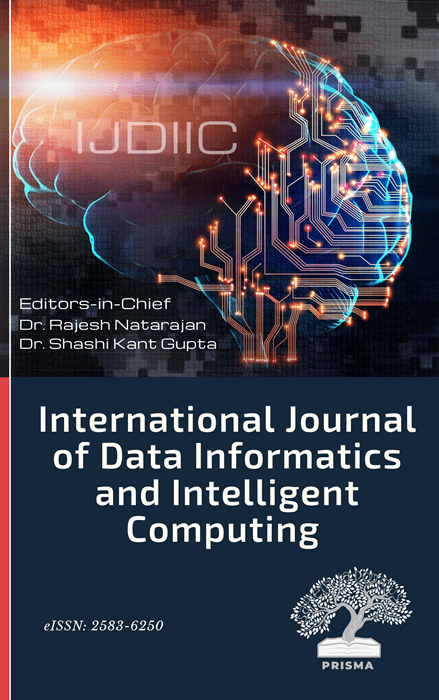Effective Utilisation of AI to Improve Global Warming Mitigation Strategies through Predictive Climate Modelling
DOI:
https://doi.org/10.59461/ijdiic.v3i3.129Keywords:
Climate Change Prediction , Artificial Intelligence, Machine Learning , Global Warming Mitigation , Adaptive Learning StrategiesAbstract
The application of Artificial Intelligence (AI) in climate prediction models significantly enhances the accuracy and efficiency of climate forecasts, addressing the limitations of conventional models. Traditional models, such as General Circulation Models (GCMs), rely on deterministic algorithms and historical data, often struggling with processing inefficiencies and inaccuracies due to their inability to handle dynamic environmental variables in real time. While GCMs produce reliable simulations grounded in physical laws, they demand substantial computational power and lack adaptability, which can lead to errors, especially in long-term climate projections. In contrast, AI-driven models leverage machine learning, particularly deep learning and neural networks, to analyse large, complex datasets like satellite imagery, ocean currents, and atmospheric variables. These models employ adaptive learning techniques, allowing for continuous recalibration and improvement as new data becomes available, ensuring more precise and timely forecasts. Compared to GCMs, AI models have demonstrated faster processing speeds and enhanced scalability despite being computationally intensive during training. AI-based models have shown significant improvements in prediction accuracy, particularly in regional climate modelling and short- to medium-term forecasts. In comparative studies, these models exhibited a 20–30% increase in prediction accuracy and a 50% reduction in processing time. However, challenges such as the need for large, high-quality datasets and the risk of overfitting persist, potentially affecting model generalizability. Nevertheless, AI models offer notable advancements in real-time climate monitoring and decision-making for global warming mitigation strategies.
Downloads
References
H. Jain, R. Dhupper, A. Shrivastava, D. Kumar, and M. Kumari, “AI-enabled strategies for climate change adaptation: protecting communities, infrastructure, and businesses from the impacts of climate change,” Comput. Urban Sci., vol. 3, no. 1, p. 25, Jul. 2023, doi: 10.1007/s43762-023-00100-2.
L. Chen, B. Han, X. Wang, J. Zhao, W. Yang, and Z. Yang, “Machine Learning Methods in Weather and Climate Applications: A Survey,” Appl. Sci., vol. 13, no. 21, p. 12019, Nov. 2023, doi: 10.3390/app132112019.
P. S. Fabian, H.-H. Kwon, M. Vithanage, and J.-H. Lee, “Modeling, challenges, and strategies for understanding impacts of climate extremes (droughts and floods) on water quality in Asia: A review,” Environ. Res., vol. 225, p. 115617, May 2023, doi: 10.1016/j.envres.2023.115617.
R. Pincus, C. P. Batstone, R. J. P. Hofmann, K. E. Taylor, and P. J. Glecker, “Evaluating the present‐day simulation of clouds, precipitation, and radiation in climate models,” J. Geophys. Res. Atmos., vol. 113, no. D14, Jul. 2008, doi: 10.1029/2007JD009334.
S. Dragović, “Artificial neural network modeling in environmental radioactivity studies – A review,” Sci. Total Environ., vol. 847, p. 157526, Nov. 2022, doi: 10.1016/j.scitotenv.2022.157526.
M. Chantry, H. Christensen, P. Dueben, and T. Palmer, “Opportunities and challenges for machine learning in weather and climate modelling: hard, medium and soft AI,” Philos. Trans. R. Soc. A Math. Phys. Eng. Sci., vol. 379, no. 2194, p. 20200083, Apr. 2021, doi: 10.1098/rsta.2020.0083.
N. Rampal et al., “Enhancing Regional Climate Downscaling through Advances in Machine Learning,” Artif. Intell. Earth Syst., vol. 3, no. 2, Apr. 2024, doi: 10.1175/AIES-D-23-0066.1.
M. Reichstein et al., “Deep learning and process understanding for data-driven Earth system science,” Nature, vol. 566, no. 7743, pp. 195–204, Feb. 2019, doi: 10.1038/s41586-019-0912-1.
R. Dong, H. Leng, J. Song, C. Zhao, J. Li, and Y. Lan, “A System For Hybrid 4DVar-EnKF Data Assimilation Based On Deep Learning,” in 2022 IEEE International Conference on Systems, Man, and Cybernetics (SMC), IEEE, Oct. 2022, pp. 2358–2365. doi: 10.1109/SMC53654.2022.9945571.
D. Rolnick et al., “Tackling Climate Change with Machine Learning,” Jun. 2019, Available: http://arxiv.org/abs/1906.05433
Y.-G. Ham, J.-H. Kim, and J.-J. Luo, “Deep learning for multi-year ENSO forecasts,” Nature, vol. 573, no. 7775, pp. 568–572, Sep. 2019, doi: 10.1038/s41586-019-1559-7.
Y. LeCun, Y. Bengio, and G. Hinton, “Deep learning,” Nature, vol. 521, no. 7553, pp. 436–444, May 2015, doi: 10.1038/nature14539.
P. D. Dueben and P. Bauer, “Challenges and design choices for global weather and climate models based on machine learning,” Geosci. Model Dev., vol. 11, no. 10, pp. 3999–4009, Oct. 2018, doi: 10.5194/gmd-11-3999-2018.
A. Chattopadhyay, P. Hassanzadeh, and D. Subramanian, “Data-driven predictions of a multiscale Lorenz 96 chaotic system using machine-learning methods: reservoir computing, artificial neural network, and long short-term memory network,” Nonlinear Process. Geophys., vol. 27, no. 3, pp. 373–389, Jul. 2020, doi: 10.5194/npg-27-373-2020.
Downloads
Published
How to Cite
Issue
Section
License
Copyright (c) 2024 A A Khadar Maideen, S Mohammed Nawaz Basha, V A Afsal Basha

This work is licensed under a Creative Commons Attribution-ShareAlike 4.0 International License.








